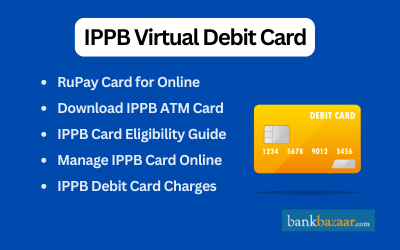IPPB ATM Card Download & RuPay Virtual Debit Card - Apply Online
India Post Payments Bank (IPPB) offers RuPay Virtual Debit Card in order to promote Government of India’s vision of ‘Digital India.’ The IPPB also aims to encourage customers to shift towards digital payments to make their transaction easier and faster.
Table of Contents
IPPB Debit Card can be generated by the customers on the bank’s mobile application. The card enables the customers to make secure digital payments for their online purchases.
The details regarding the virtual debit card, its eligibility criteria, benefits, and exclusive features are listed below.

Eligibility for IPPB ATM Card & Virtual Debit Card
The eligibility criteria to avail IPPB RuPay Virtual Debit Card are as follows:
The exclusive features of the debit card are as follows:
- As the card operates in Tokenization method, it is convenient for the customers in case the card is either stolen or lost as no platform could store the information of the card
- The card is also convenient and safe for recurring payments
- IPPB also offers option to link either renewed or replaced cards with existing merchants for easy checkout experience.
How to Use, Download & Manage IPPB ATM Card Online
The other details regarding the debit card are as follows:
- The debit card can be self-generated blocked, unblocked by using the IPPB mobile banking app.
- The customers can set their own per day payment limits.
- The card is accepted on all RuPay enabled e-commerce sites or platforms.
- The card also provides several attractive offers, instant discounts, and cashbacks on paying utility bills.
Charges for Issuing IPPB RuPay Virtual Debit Card
The following are the charges for availing a IPPB debit card:
Categories | Charges |
Issuance Charges | Rs.25 (inclusive of GST/Cess) |
Usage and Transaction Charges for E-commerce | No Charge |
Reissuance Charges | Rs.25 (inclusive of GST/Cess) |
Annual Maintenance Charges | Rs.25 (inclusive of GST/Cess) |
Blocking/Unblocking Charges | No Charge |
Minimum Daily Purchase Limit for E-commerce | Rs.1 |
Maximum Daily Purchase Limit for E-commerce | Rs.50,000 |

FAQs on IPPB Debit Card
- How can I apply for the IPPB Virtual RuPay Debit Card?
The IPPB Virtual RuPay Debit Card can be self-generated from the IPPB mobile banking application.
- What is the per day limit in the IPPB Virtual RuPay Debit Card?
The customers can set their own per day limit in the IPPB Virtual Debit Card.
- Is there any issuance fee that needs to be paid for IPPB Virtual RuPay Debit Card?
Yes, Rs.25 (inclusive of GST/Cess) needs to be paid as issuance fee for availing IPPB Virtual Debit Card.
- How can I block or unblock my IPPB Virtual RuPay Debit Card?
You can block or unblock your debit card through the bank’s mobile banking application.
- Is there any annual maintenance charge that needs to be paid for IPPB Virtual RuPay Debit Card?
Yes, Rs.25 (inclusive of GST/Cess) needs to be paid as Annual Maintenance charges for IPPB Virtual Debit Card.
- Is there any reissuance charge that needs to be paid for IPPB Virtual RuPay Debit Card?
Yes, Rs.25 (inclusive of GST/Cess) needs to be paid as reissuance charges for IPPB Virtual Debit Card.
- What is card tokenization?
In order to safeguard customers card details, the India Post Payments Bank replaces the card details with tokens. In this method of payment, card details cannot be saved by the merchant payment gateway as different tokens are issued, each time you make an online payment for different platforms.
- Who is eligible for the IPPB Virtual RuPay Debit Card?
All the customers having an account in the India Post Payments Bank are eligible for IPPB Virtual RuPay Debit Card.

Disclaimer
Credit Card:
Credit Score:
Personal Loan:
Home Loan:
Fixed Deposit:
Copyright © 2026 BankBazaar.com.
